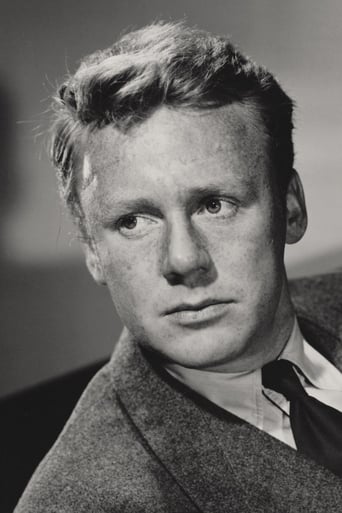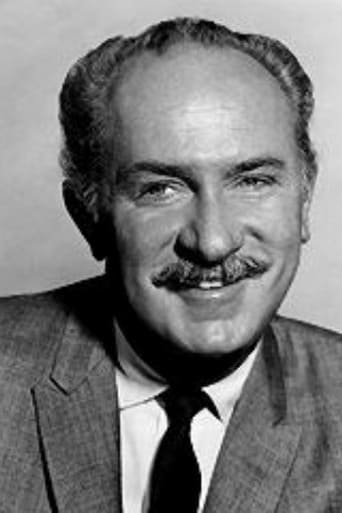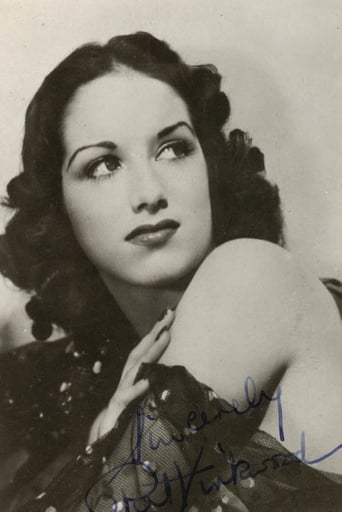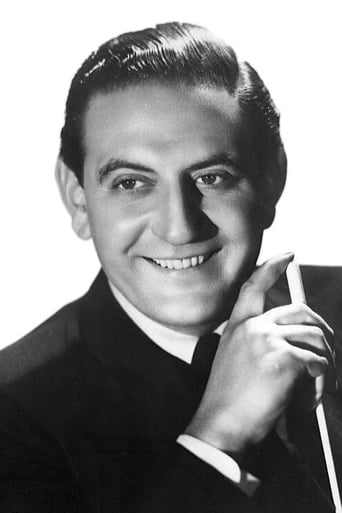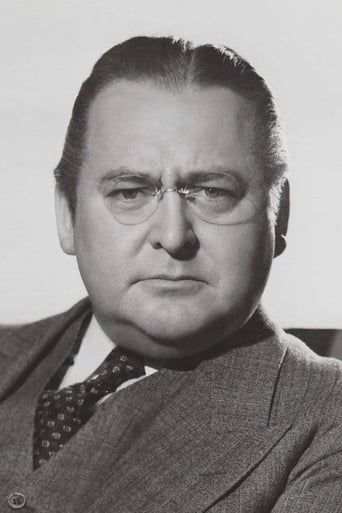Scanialara
You won't be disappointed!
Teringer
An Exercise In Nonsense
Jakoba
True to its essence, the characters remain on the same line and manage to entertain the viewer, each highlighting their own distinctive qualities or touches.
Caryl
It is a whirlwind of delight --- attractive actors, stunning couture, spectacular sets and outrageous parties. It's a feast for the eyes. But what really makes this dramedy work is the acting.
max von meyerling
There is absolutely no reason to see NO LEAVE, NO LOVE. It's not really awful, or terrible, just a lot of milling about to little effect. Just another routine offering which aimed at mindless entertainment and failed. It is of some historical importance however as it represents the fault line between wartime entertainment and post-war films. This has all the hallmarks of a wartime film. The sub-genre is the soldier on leave. To get a decent leave in the war one had to be a war hero and the one here is probably the biggest male star to come out of WW2, Van Johnson. He has a wise guy hustler buddy, Keenan Wynn. They spend a lot of time in night clubs and radio stations allowing for frequent interruptions for musical numbers. There are two bandleaders in this picture. Bandleaders were the glamorous pop idols of the day. In this picture they are Guy Lombardo and Xavier Cugat which shows that the audience was defined as strictly squares from Delaware. I'd like to see a contemporary film about the era play some of this schlock instead of the acceptable jump songs like In The Mood or Sing, Sing, Sing. Wartime "A" films were a little bit of everything (and an inspiration to Bollywood) and popular music acts were interspaced between narrative exposition. Another trope of the era was the housing shortage with it's hilarious and zany mix-ups. A pompous industrialist and a Russian opera singer share their hotel suite. War Hero can't wait to get back to marry his girl in Indiana. There's another girl who has a big hit radio show that the War Hero appears on (actually his wise guy friend pretending to be him, more hilarity) who is asked by War Hero's mother to keep him there so she can get a train in order to tell him to his face that his girl isn't, ah, available to him anymore. Somehow a Medal of Honor winner can't handle a dear John letter and is terrified on the radio. And so on. Guess who he falls for. Guess who her father turns out to be.The formula, plot music act plot music act, existed as early as Buck Privates and The Fleet's In. Compare to a late example like Kiss Them For Me (1955) (which loses the music and features mid 50s style hair and clothes.) It was what people wanted t see when they went out to the movies. The problem here was that the war ended and all of these issues were in the past and not au courent. This in not what people wanted to see. People were obsessed with getting married, starting a family, getting a good job, getting a house and a car. Warner's bought The Voice of the Turtle, a great wartime Broadway hit for the return of Ronald Reagan and it bombed. On The Town was a great wartime Broadway musical hit but wasn't filmed until some years later and covered the change in a simple line of dialogue explaining why there was a female cab driver still on the job even though the war had ended and the male drivers had returned. It didn't pretend to be taking place during the war.So No Leave, No Love (it's title seems to promise a different story) has a framing devise that tells the story as a flashback. Now I don't know if the film was filmed as a soldier-on-leave picture and they had to go back and film the beginning and end parts, of if the scenes were added at the script stage or if it had simply been planed that way. The fact that there are two cinematographers credited seems to argue for a re-shoot. It is interesting because a hallmark of the noir is the flashback but here it is used not in bitterness but warm nostalgia. Remember all that stuff we used to think was so important a year ago? Well, no one is interested.Far more important is that the framing devise illustrates the transition to a post war sensibility which can be simply put as - date; mate; and procreate. That baby boom didn't just come from nowhere. The opening scene shows Van Johnson in the father's waiting area of the maternity ward. Then he tells his story to another expectant father. At no moment does anyone in this picture exhibit even a slight betrayal of actual human behavior. People just act like they're in a movie. The cliché acting in the expectant father's waiting room is just so stylized to make Noh seem improvised.Of course these pictures are nearly unwatchable today and what we remember from this era are the cheapo "B" movies known as film noir, the great "nay" to the sunny "yes" of "A" films like this. Maybe if the noirs had been the popular genre there would be missing another 50 million Americans and my apartment wouldn't be so expensive but America was just happy to hump away for about 20 years after the war churning out brats. The last shot is of the new born nine pound boy, the ghostly "aahs" can be heard from sixty some years across the ether. So instead of the happy ending being a trip to the altar, we have Mom and Dan and baby make three. There's no reason to see this film unless you want to see the cinematic mid ocean rift between wartime and post war films. But if you're a sociologically bent cineast its kind of a don't miss.
bkazmer
A nice all around WWII film of Marines coming home to music, parties and women. There were three songs by the female lead Patricia Kirkwood, and it seemed even more by the woman portraying the Russian singer played by Marina Koshetz. She was a real life opera singer who did the difficult Eugene Onegin on stage for a debut. One of the highlights was the two "prodigies" with Frank 'Sugar Chile' Robinson playing piano and singing "Caledonia" and then Joey Preston on Drums looking like a tiny Gene Krupa. Both seemed to be around 10 or 11 years old. Neither seems to have recorded anything after around 1950! I wonder what happened to them. The Garcia's (Dance Team) were superb! And Elizabetmora... did you ever find a copy? I have one if you need it.
Elizabetmora
I started to look for things connected with my youth. the Garcias whom were a dance team are my brother and sister. I have been looking to purchase this movie and would like to know how and where.. I was very surprised to see this movie picture come up, The Garcias were a great dance team that also danced at the copacabana and other clubs of the 50's. There are other movies that they danced in most of the time with Xavier Cugat. Looking for those The internet is a wonderful thing. I am also proud to know that my brother was, in fact the first to dance with a glass of water on his head.I haven't seen it in at least 30 years. I thought it was great.
Eleanor Knowles Dugan
British star Pat Kirkwood is a delight in her only Hollywood film. A simple plot is diluted by sticking in opportunities for a half dozen other talents to do bits which are then diminished by cutting away to others chatting! Cugat and Marina Koshetz are wasted. Ms. Kirkwood says that on the first day of shooting, Van Johnson greeted her congenially and told her, "This picture is going to be a real stinker, so we might as well have a few laughs and forget it." Actually, the film is rather fun if you accept it as a light-weight, and Kirkwood's bouncy song "Love on a Greyhound Bus" is worth the price of admission. (Singer-dancer Van Johnson neither sings nor dances!)

